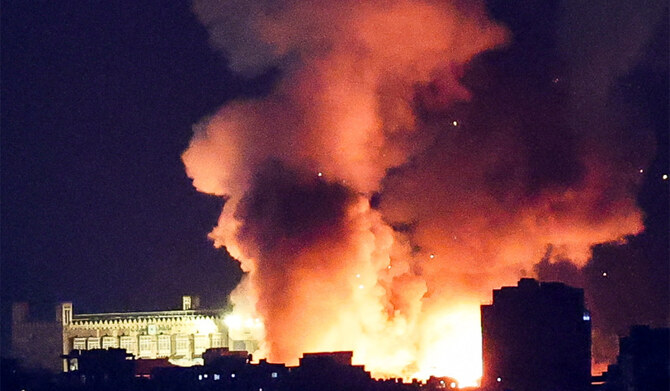BEIRUT: Israel’s military struck outside the gates of a hospital in southern Lebanon without warning on Friday, killing seven paramedics and forcing the facility to close, the hospital director told The Associated Press a day after one of the most deadly attacks on health workers in the weeks since fighting escalated between Israel and Hezbollah.
The account of the Friday airstrikes that flung hospital doors off their hinges and shattered glass was the latest to detail attacks that Lebanon’s health ministry says have killed dozens of health workers.
Marjayoun hospital director Mounes Kalakesh said that even before Friday’s attack, ambulance crews in the area were so reluctant to operate that the facility had not received anyone wounded for days.
“We have not been able to work. There was fear and panic among the staff,” he said.
Kalakesh said the government hospital didn’t receive any warning from Israeli forces before the attack, even though nearby villages have received such warnings to evacuate.
Israel has not commented specifically on the incident. Friday’s attack came hours before Israel’s Arabic-language military spokesman accused the Hezbollah militant group, based in southern Lebanon, of using ambulances to transport weapons and fighters, and warned medical teams to stay clear of the group. The spokesman provided no evidence.
It is a charge that Lebanese officials and hospital directors, including Kalakesh, deny. Lebanon’s health minister has accused Israel of committing “a war crime” by targeting medical teams and paramedics.
The health ministry on Thursday said 40 paramedics, firefighters and health care workers had been killed in Israeli attacks over three days, making it even more challenging to care for people wounded in the intense fighting.
The ministry has said more than 100 health workers have been killed in the year since the war in Gaza began and since Israel and Hezbollah stepped up exchanges of fire along the border.
The paramedics with the Islamic Health Committee are part of the coordinated health ministry response to crises in Lebanon. Other civil defense teams have expressed concern for their safety, with some saying they came under attack while clearly identified and operating in areas where they were transporting the wounded or putting out fires.
Israeli strikes have landed near the Marjayoun hospital before but never had come so close, Kalakesh said. He described the paramedics dying in their burning vehicles.
The 45-bed hospital is now shut down.
“I am responsible for this staff. I must protect them,” Kalakesh said, explaining the decision to evacuate. At the time of the Friday attack, there were 30 staff in the hospital. His team was already exhausted after a year of working close to the front line.
Other groups have expressed concern.
A Lebanese Red Cross convoy, escorted by Lebanese troops and coordinated with the UN peacekeeping force in Lebanon, came under fire on Thursday. A Lebanese soldier was killed and four Red Cross volunteers were wounded.
Separately on Thursday, Israeli forces struck rescue teams with the Islamic Health Committee in Beirut’s southern suburbs and the southern village of Odeissah, killing at least four.
In Odeissah, responding ambulances were hit by Israeli fire and three medics who were wounded in the initial attack were killed as rescuers tried to reach them, the health ministry said. In the Beirut suburbs, the team working to remove rubble from the initial airstrike was hit in a drone attack that killed a driver and wounded seven, said Islamic Health Committee spokesman Mahmoud Karaki.
Targeting the health sector undermines the safety net for the public, Karaki said, He said 145 of his team members have been wounded over the past year.
Lebanon’s health ministry has said nine hospitals and 45 health care centers have been damaged during that time.
Hours after the Friday attack outside Marjayoun hospital, another hospital in the southern town of Bint Jbeil was shelled by Israeli forces after receiving a warning to evacuate. Nine members of the medical and nursing staff at Salah Ghandour Hospital were wounded, most of them seriously.
The hospital later shut down because of the damage.



























